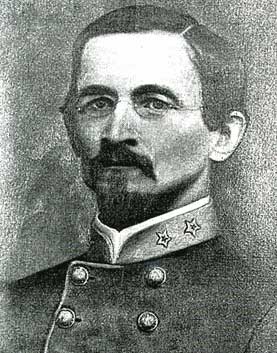Charles Marshall (colonel) facts for kids
Quick facts for kids
Charles Marshall
|
|
|---|---|
 |
|
| Born | October 3, 1830 Warrenton, Virginia |
| Died | April 19, 1902 (aged 71) Baltimore, Maryland |
| Place of burial |
Green Mount Cemetery
Baltimore, Maryland |
| Allegiance | |
| Service/ |
|
| Years of service | 1861–1865 |
| Rank | |
| Commands held | Military Secretary, Assistant Adjutant General Army of Northern Virginia |
| Battles/wars | American Civil War |
| Children | Hudson Snowden Marshall |
| Relations | Col. Timothy Andrews (father-in-law) Col. Richard Snowden Andrews (brother-in-law) |
| Other work | Lawyer Professor |
Charles Marshall (born October 3, 1830, died April 19, 1902) was a lawyer from Maryland. He was also an officer in the Confederate Army during the American Civil War. Marshall worked closely with Robert E. Lee, a famous general. After the war, he helped remember the soldiers and events of the Confederacy.
Contents
Early Life and Family
Charles Marshall was born on October 3, 1830, in Warrenton, Virginia. His parents were Alexander John Marshall and Maria Rose Taylor. Charles was a distant relative of Chief Justice John Marshall. He was also a cousin of World War II General George Marshall.
He went to private schools in Warrenton. Later, he studied at the University of Virginia in Charlottesville. He earned a Master's Degree with high honors in 1848.
In 1856, Charles Marshall married Emily Andrews. Her father was Timothy Patrick Andrews, a hero from the Mexican War. Charles and Emily had one daughter, who sadly died young. In 1866, Marshall married again to Sara Rebecca Nicholls Snowden. They had five sons, including a lawyer named Hudson Snowden Marshall, and one daughter.
Becoming a Lawyer
From 1850 to 1852, Marshall taught mathematics as a professor at Indiana University. After that, he moved back to Virginia to study law.
In 1853, he moved to Baltimore, Maryland. There, he passed his law exams and started working as a lawyer. He joined the law firm of William Schley.
Role in the Civil War
A long-time family friend, General Robert E. Lee, asked Marshall to join his personal team. This happened on March 21, 1862. Marshall started as a captain.
Marshall served as Lee's personal assistant, called an aide-de-camp. He was with Lee during all the major battles of the Army of Northern Virginia. Over time, he was promoted to major, then lieutenant colonel, and finally colonel.
One of Marshall's main jobs was writing Lee's official reports after battles. He was also with Lee when the Confederate Army surrendered at the Appomattox Courthouse. Marshall helped write the terms of surrender that Lee accepted. He also found the house where the surrender meeting took place. After the surrender, Marshall helped draft Lee's famous "Farewell Order" to his army.
Life After the War
After the Civil War ended, Marshall went back to Baltimore. He continued his work as a lawyer and became one of the city's top attorneys. He gave important speeches for monuments built to honor both Robert E. Lee in Richmond, Virginia and Ulysses S. Grant in New York City.
Later Years and Legacy
Charles Marshall died in Baltimore, Maryland, in 1902. He passed away from a stroke. He was buried in Green Mount Cemetery in Baltimore.
His writings and papers were later put into a book called Lee's Aide-de-Camp. This book was edited by Sir Frederick Maurice and later by Gary W. Gallagher.
Charles Marshall has been shown in several films and TV shows:
- Henry B. Walthall played him in the 1930 film Abraham Lincoln.
- Tim Ruddy played him in the film Gettysburg.
- John D. Bert played him in the related film Gods and Generals.
- He is also a character in the 1992 novel The Guns of the South by Harry Turtledove.
- Harris Katleman played Marshall in The Rebel TV series episode "Johnny Yuma at Appomattox".
 | William M. Jackson |
 | Juan E. Gilbert |
 | Neil deGrasse Tyson |

